Junior doctors row: 98% vote in favour of strikes
- Published
- comments
Three junior doctors spoke to Tim Muffett about why they support strike action
Junior doctors in England have overwhelmingly voted in favour of going on strike in their dispute with ministers over a new contract.
Some 98% voted in favour of a full strike and 99% in favour of action just short of a full strike.
The first walk-out will start on 1 December with another two dates earmarked for later in the month.
Health Secretary Jeremy Hunt said the doctors' decision was "very, very disappointing" news.
And he rejected calls for talks to be held at conciliation service Acas, although he would not rule it out completely.
"Study after study has shown that our mortality rates at weekends are too high," he said.
In full: Jeremy Hunt interview with Laura Kuenssberg
"We put forward a very fair offer for doctors, which will see pay go up for three-quarters of junior doctors. We wanted to talk about this to them, but in the end they have chosen to strike so we will have to put in contingency plans."
He also said that the government's offer had been "misrepresented".
'Unsafe contract'
The British Medical Association (BMA) said it was "inevitable" disruption would be caused to patients as a result of the strikes, but maintained it had been left with no choice as the contract was "unsafe".
The action is likely to lead to the cancelling and rescheduling of thousands of routine appointments, tests and operations with the NHS forced to prioritise emergency cases.
The union has asked the Advisory, Conciliation and Arbitration Service (Acas) to get involved to offer independent arbitration - something the Academy of Medical Royal Colleges, which normally stays out of politics, has said it supports.
The dates for industrial action are:
08:00 GMT 1 December to 08:00 GMT 2 December (junior doctors to staff emergency care)
08:00 GMT to 17:00 8 December (full strike)
08:00 GMT to 17:00 16 December (full strike)
The BMA balloted just over 37,700 members - over two-thirds of the workforce - and 76% took part in the ballot.
Paris attacks: The young doctor who treated first casualties

What will happen in a strike?
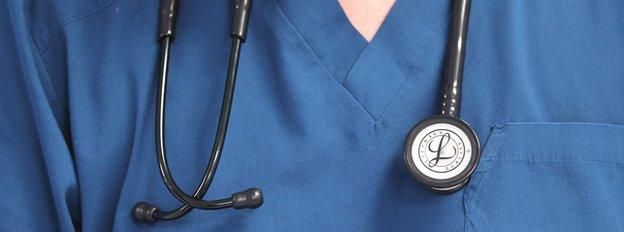
Services will be disrupted, make no mistake about that. But the British Medical Association argues the aim of doctors taking part will not be to maximise that - as is the goal in many other industrial disputes.
On the first day of action that has been earmarked, junior doctors will still staff emergency care. On the other two dates, they will walk out in the knowledge there will be other medics - consultants, staff doctors and locums - that can plug the gaps.
Whether that will be enough for hard-pressed emergency services will be argued over ahead, during and after any walkout.
What is certain, though, is routine services will suffer. Hip operations, knee replacement and routine clinics will have to be cancelled.
In fact, as happened the last time doctors took action in 2012, over pensions, expect hospitals to start rearranging services in advance.
Want to know more about the dispute?

The vote comes after thousands of doctors have taken part in a series of protests in recent months in the contract dispute.
Talks broke down last year, and ministers have since said they will impose the new contract from next year.
As the ballot papers went out a fortnight ago, Health Secretary Jeremy Hunt made a last ditch attempt to persuade doctors to accept the offer.
He wrote to all the doctors in the country with a fresh offer.
It included a promise of an 11% rise in basic pay, but the BMA said this was misleading as it was offset by curbs to other elements of the pay package, including unsociable hours payments.
Ministers have promised to protect pay for the first three years of the deal.
But the BMA has said there are insufficient safeguards to stop hospitals overworking doctors and they could lose out financially in the long term.
Junior doctors row
55,000
junior doctors in England
37,700
balloted over industrial action
-
£3.1bn spent on junior doctor pay currently
-
11% rise in basic pay offered
-
25% cut in weekly hours that attract a premium unsociable hours payment
After the result of the ballot was announced, BMA leader Dr Mark Porter said: "We regret the inevitable disruption that this will cause but it is the government's adamant insistence on imposing a contract that is unsafe for patients in the future, and unfair for doctors now and in the future, that has brought us to this point.
"Our message to him is that junior doctors have today made their views perfectly clear but that it is still possible to get back around the negotiating table to deliver a contract that is safe for patients, contains the necessary contractual safeguards to prevent junior doctors being overworked and properly recognises evening and weekend work."
Meanwhile, Labour shadow health secretary Heidi Alexander has written to the prime minister to ask him to intervene, saying the profession had "lost confidence" in Mr Hunt. She also wants to see independent arbitration.
The letter - seen by the BBC - says: "With the NHS facing its most difficult winter in recent memory, and the prospect of industrial action now looming, it is imperative that urgent steps are taken to resolve this dispute."
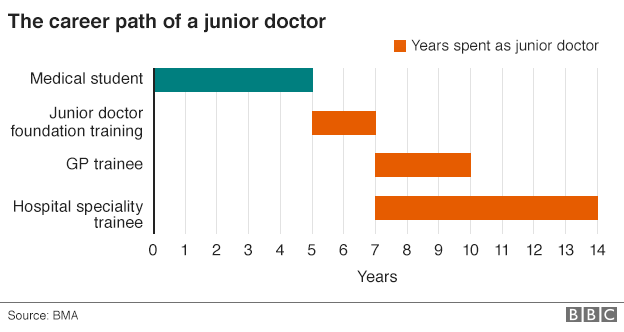
Roger Goss, of the campaign group Patient Concern, criticised the way both sides had handled the dispute but said doctors should not go on strike.
"This is the worst news for patients in the history of the NHS. What happened to the promise that the interests of patients are paramount and we put patients first?
"Any honourable doctor with a genuine vocation who wants to preserve the high esteem which the medical profession currently enjoys will refuse to cause suffering inherent in a full-scale walk-out."
Scotland and Wales have said they do not want to introduce the contract changes, while Northern Ireland has yet to make a decision.
- Published19 November 2015
- Published4 November 2015
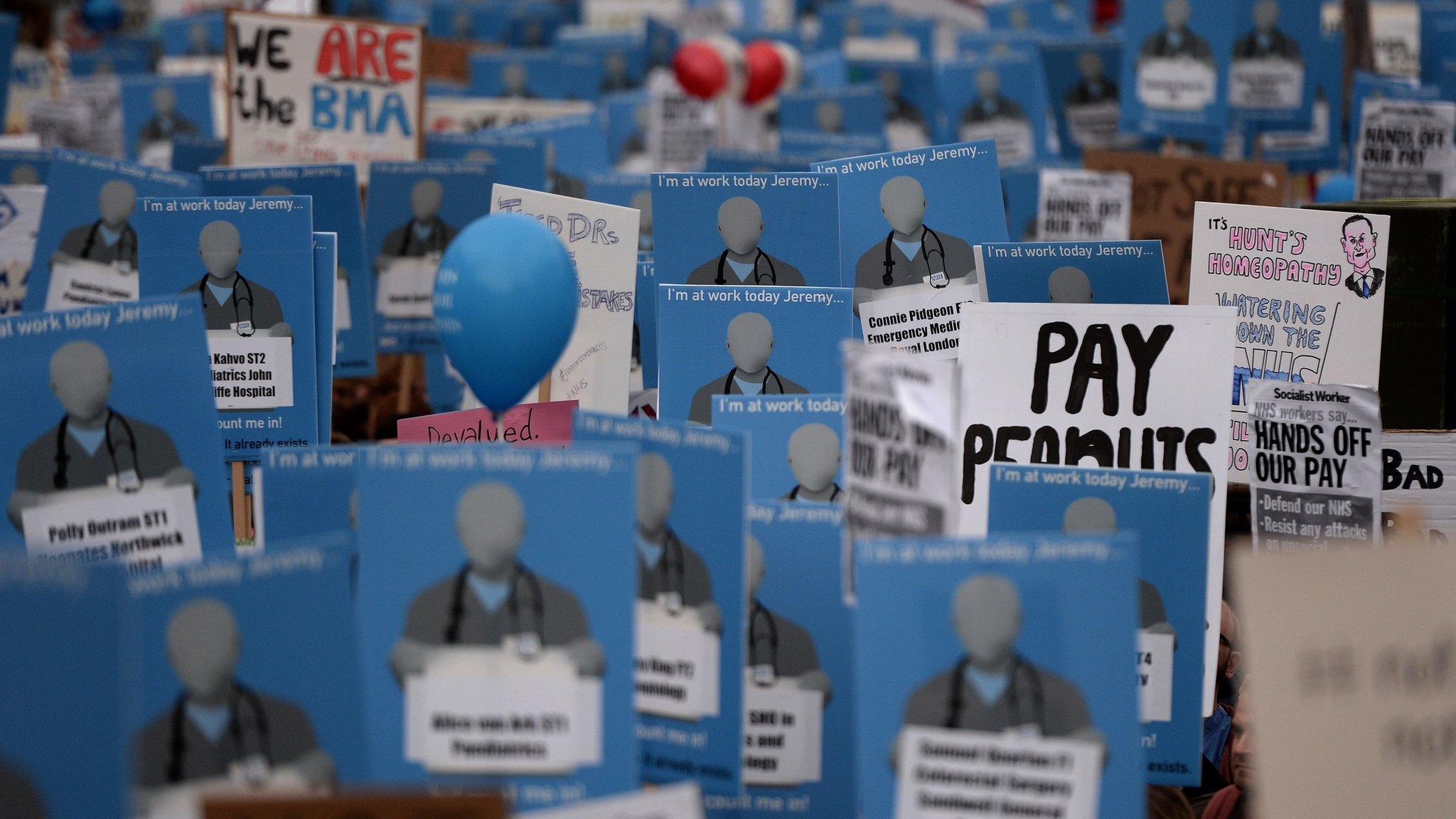
- Published4 November 2015

- Published4 November 2015
- Published21 October 2015

- Published4 November 2015

- Published19 October 2015
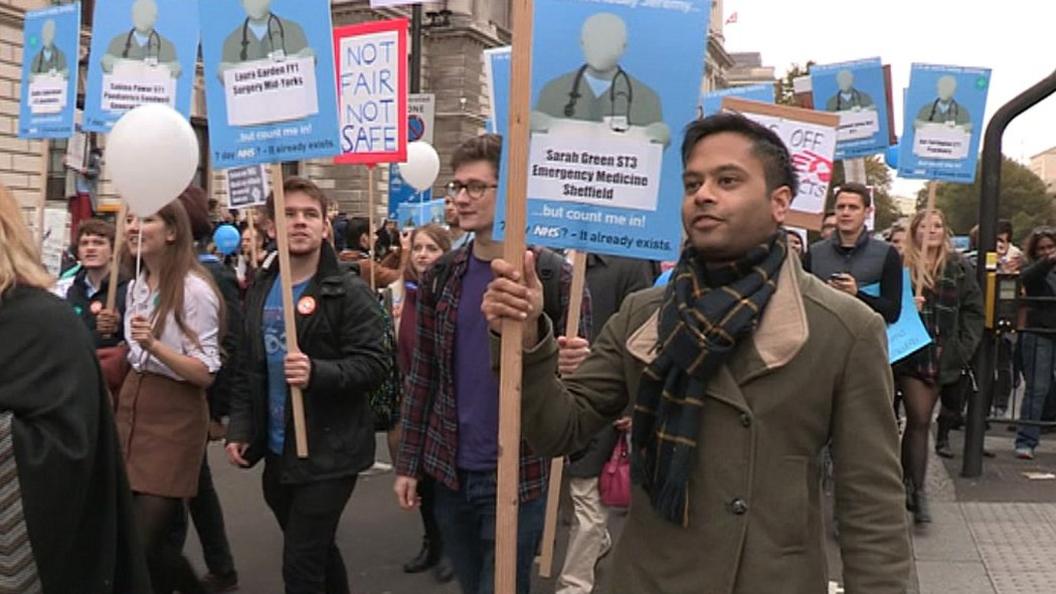
- Published28 September 2015
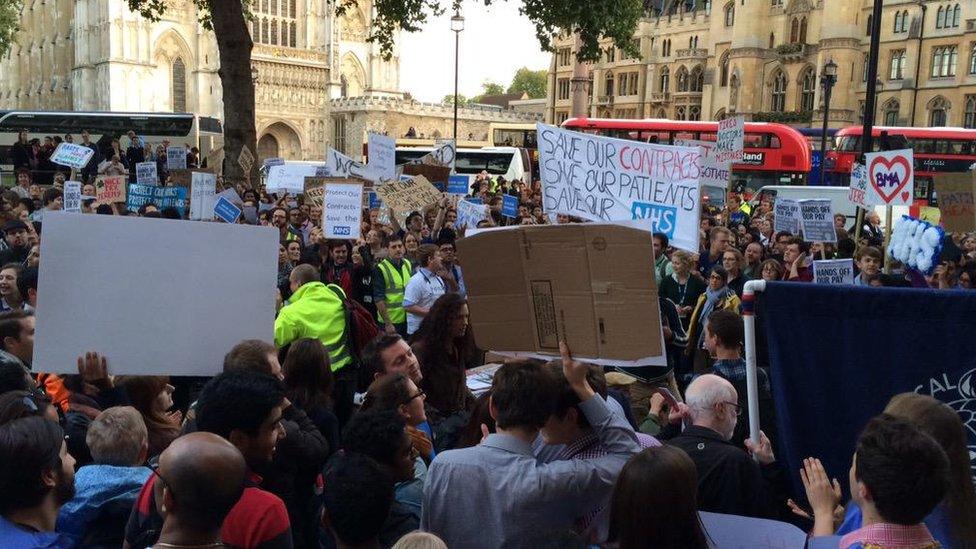
- Published26 September 2015
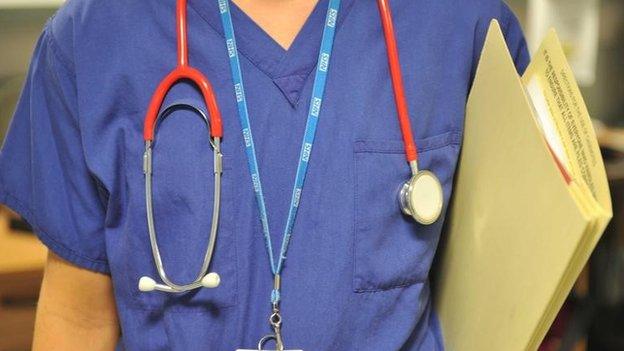
- Published28 September 2015
- Published3 November 2015
